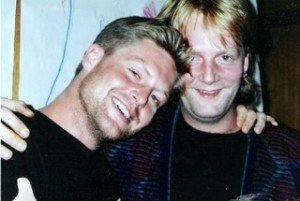About Completion
Someone who has experienced profound loss and been in turmoil for over a year has just emailed me. She is asking herself if she even wants completion, she just isn't sure.
The title of the workshop includes the word "completion", which can have many differing interpretations depending upon who is hearing it. For me, completion does not mean "getting it over with" or "getting rid of" or forgetting, leaving behind, erasing.
The sudden death of my son, Jeff, when he was 30 years old, led me to into discovering so many insights about the nature of grieving. One of them is that there is no value in pursuing any of those things. Actually, those intentions compound suffering.
Jeff in the foreground leaning on his brother Scott.
When I say completion, I mean becoming aware of and clearing those particular emotional and psychological roadblocks (many of which are unconscious) that deplete my desire and capacity to engage with life in my present and future.
As Stephen Jenkinson, GriefWalker, says:
"What if grief is a skill, in the same way that love is a skill, something that must be learned and cultivated and taught? What if grief is the natural order of things, a way of loving life anyway?"
Grieving was not an acknowledged or appreciated skill that was passed down through the generations in my family, although I believe there was a great deal of suffering in isolation.
As a result of this consideration of what "completion" means, I may alter the title of the workshop. At this moment in my consideration, I am holding completion to be related to "coming to terms," "clearing away the boulders stopping me from moving forward on life's pathway" "reaching beyond the roadblocks that prevent me from connecting with the people and events that are present in my life."


